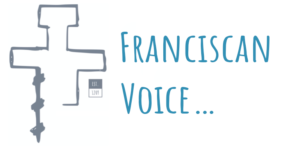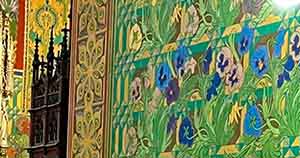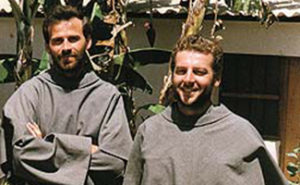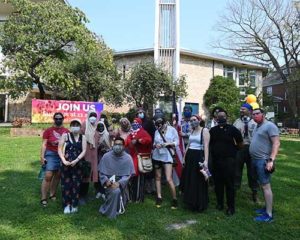Friars and Ukrainian Refugees
Praying in the Basilica of Saint Francis in Kraków, Friar Arek Żelechowski contemplates the wall mural of pansies woven into trellis-style lattice work, his attention drawn to the blue and yellow flowers painted in the same hues of the Ukrainian flag. Arek would later share with me that the name of the flower in Polish is “bratki”, which means “little brother”.

The friars in Kraków have welcomed their “little brothers and sisters”, Ukrainian refugees (children, mothers, and grandmothers) with open arms. I imagine that they could easily attach the names of each of the refugees, to whom they have ministered in these past months, to a specific flower on the wall of the basilica.
During Holy Week and Easter, I came to appreciate how our Franciscan bratki are Christlike in their ministry. Some friars are busy preparing a place by organizing rooms, supplies, food, and ensuring there is a plan where grace can flow freely for those who are in need. Other friars eat and drink with the refugees or bring healing by accompanying them to the hospital or medical clinic. Children often arrive dehydrated and sickly.

Friar Karol Haberek shared with me how he and the other friars in formation go regularly to the train station to bring refugees to the friary for a different kind of washing of the feet, by the offering of a shower and some clean clothes before they continue their journey westward. The friars often accompany their guests by way of the main square because they came to realize that taking a moment to watch people going about their everyday lives, always seems to calm the refugees.
Our Franciscan bratki embody the fulfillment of Jesus’ promise to send the paraclete. For they work tirelessly in a spirit of holy flexibility, attending to anything and everything that comes their way, in a manner that brings consolation and strength to hearts that are troubled.
The “bratki” pansies mural in the basilica was painted by the artist Stanisław Wyspiański and is consider the height of the Polish Arts & Crafts Movement (1890-1918). Inspired by the Fioretti of St. Francis, he decorated the walls of our basilica using the familiar local flowers found by the wayside from the river to the basilica. In the same manner, Mary and the saints are dressed in the clothing of the poor folk of the time.
Wyspiański’s art echoes the words of Pope Francis, when he speaks of Saint Francis of Assisi, “He was particularly concerned for God’s creation and for the poor and outcast. He loved, and was deeply loved for his joy, his generous self-giving, his openheartedness… He shows us just how inseparable the bond is between concern for nature, justice for the poor, commitment to society, and interior peace. (Laudato Sí, 10).

Watching, listening, and working alongside the friars during Holy Week, I have come to appreciate them as a lattice work of “Easter flowers/bratki”, true lesser brothers, writing their own chapter in the Franciscan Fioretti of today as their story becomes interlaced with the stories of their little sisters and brothers from Ukraine.
After breakfast on Easter morning, as I said good-bye to the refugees in the friary, a little girl (who with her mother had experienced first-hand the horrors of the war) hugged me and handed me a cookie in the shape of a heart. It was decorated in the blue and yellow colors of Ukraine. Turning to her mother I saw tears in her eyes, tears of a mother on Calvary with a broken heart full of love.
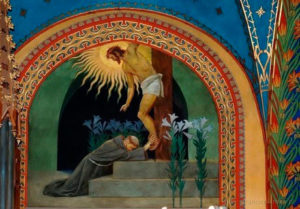
– friar Michael Lasky OFM Conv.
General Delegate for JPIC
